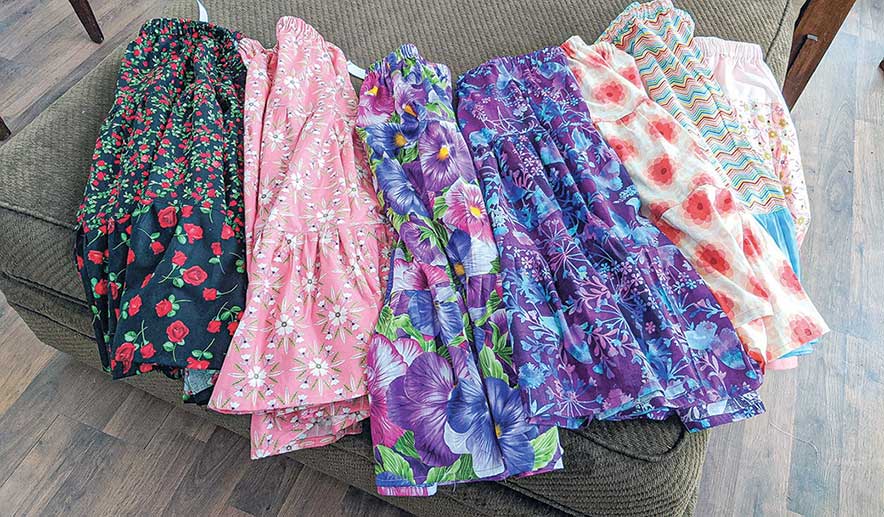
Amid pandemic, ‘Shimásání bi Skirts’ serves grandmothers

Courtesy photo | Teresa Frazier
Navajo skirts hang on a sofa inside the home of Teresa Frazier and her husband, Curtis G. Frazier Sr., in Blanding, Utah. Teresa makes at least two skirts every weeknight to give to Diné women ages 60 and up, through the NavajoStrong organization.
By Krista Allen
Special to the Times
BLANDING, Utah
When Teresa Frazier finishes a batch of Navajo skirts, she sanitizes them by soaking them in Lysol then machine-washes them before tossing them in a dryer.
When the skirts are dry, she twists them up and places them into plastic bags, along with her project logo sticker, and ties it with a glittery ribbon so that when the women receive them, they will have the joy and anticipation of opening a gift, said Frazier, director of Upward Bound at Utah State University’s Blanding campus.
Frazier, Diné, is the mother of Curtis G. Frazier Jr., better known as “Bud,” the founder of the nonprofit NavajoStrong, a coronavirus relief effort that provides Diné on the Navajo Nation with a storage bin full of food, water, cleaning supplies, homemade face masks, and items such as blankets, toys for children and diapers for infants.
And now, three-tiered skirts will be included in bins for women 60 and up. This was made possible through her skirt project, “Shimásání Bi Skirts.”
“A lot of Navajo moms and grandmothers really never buy things for themselves,” Frazier said. “They always make do with what they have.
“So this is the opportunity to give them something special, something that will help them and empower them and give them the strength to keep moving forward,” she said, “and have some fun and joy untying the ribbons and opening the present (in the middle of) this craziness that’s going on.”
As a public service, the Navajo Times is making all coverage of the coronavirus pandemic fully available on its website. Please support the Times by subscribing.
How to protect yourself and others.
Why masks work. Which masks are best.
Resources for coronavirus assistance
Shimásání Bi Skirts started around mid-June when her friend, Stella Oliver, left a four-tiered floral print skirt and a matching blouse inside a bag on her doorknob.
“And then all of a sudden, all these thoughts started going through my head,” FrazIer said. “I thought, ‘This is going to be amazing’ because … when we’ve gone out to deliver those bins, some (older women) had really tattered dresses, especially those who live in remote areas where they don’t have electricity and probably don’t have a sewing machine.”
Frazier posted on Facebook June 14 a photo of the floral print outfit and asked her seamstress friends if they could make skirts to include in the bins. Later that evening, she made another post with instructions for making a Navajo skirt with an elastic waist.
“We have a NavajoStrong team up in Utah County and they shared it with their friends once I put that on my Facebook,” Frazier explained. “And all of a sudden, we had these two women from Lehi, Utah, who donated nearly $1,000 worth of fabric (and thread) to make these skirts.”
The Lehi women not only donated fabric and thread, they also made some skirts, filling two storage bins, and then sent them to Frazier in Blanding. Some of the fabric was already precut and stitched with a serger.
“That was really good,” Frazier said. “So I started to make them. As I started to make them, I said, ‘Wow, this reminds me of my mom.’
“My mom used to come to our house because she had no running water or electricity,” she said. “She would stay for months and she loved to stay. One of the reasons she loved it so much was so she could sew.”
Frazier’s late mother, Mary Marie Boone Mike from the Tsé Łigai Deez’áhí area, near Tonalea-Red Lake, Arizona, enjoyed sewing.
After spending a day shopping for fabric with her daughter in northern Utah, where Teresa and her husband, Curtis G. Frazier Sr., and their family used to reside, the two went home to American Fork.
“We would hear the hum of her sewing machine just night and day – all the time,” Frazier said. “She made her own Navajo skirts. She never had a measuring tape, never had scissors, and she used her arm to measure how long she wanted her skirts. She loved to make four tiers on her skirts instead of the three that I make.
“And she would make a big waist band and put a big safety pin on it and she’d say, ‘I make this like this so when we butcher a sheep and we eat, I can loosen up my skirt and I can fit into my skirt.’ She was pretty humorous.”
Frazier said while she made skirts from the fabric the Lehi women sent, she started to think about the strength and the innumerable sacrifices Diné mothers often make to give their children a better life.
“They have to endure a lot and there are never any complaints,” Frazier said. “They are resilient. And part of what NavajoStrong wants to do is empower our people, empower them that even though we’re going through this COVID and even though there’s a lot of suffering going on, giving them things that will help them is something that we all want to do with NavajoStrong.”
Frazier makes at least two skirts every weeknight – after working all day at the university – inside her sewing room where she has two tables: one for her Singer Patchwork sewing machine and one for her rotary cutting mat.
She also has water and snacks closeby to stay energized during the skirt-stitching process until around midnight.
Each tier is 11 inches wide. The bottom tier, which takes the most fabric, is made up of three 44-inch panels. The middle tier has two 44-inch panels, and the top has one panel plus 10 inches for the elastic.
Because not all Diné women are the same size, Frazier made some a little bit shorter for better fit.
“It’s kind of my appreciation for our (mothers and our grandmothers), for the love that they have for all of us,” she said, “and the love my mom had for me and my family.
“Bud came home one weekend and I got a skirt out, ‘Look what I made!’ I showed him and he’s like, ‘Oh, my gosh! That reminds me of grandma!’ So, any Navajo skirt is like that,” she said. “I just really appreciate the women that donated the fabric and who are so giving.”
Frazier said so many people give to NavajoStrong and many of those people will never meet the Diné elders nor the children who receive the bins of supplies.
And the people who’ve donated fabric to Shimásání Bi Skirts most likely will never meet the strong Diné women who will wear them like armor.
“Number one, skirts make you feel good to have something new,” Frazier said. “And number two, it’s beautiful and to get it from somebody who has made it with love and who bought the fabric with them in mind.
“And knowing that they would love the fabric and love the vibrant colors,” she said. “It was made with love for them. I think it will empower them to have the strength to get through this coronavirus pandemic.
“(Families) can’t really go shopping,” she added. “Everything’s on lockdown on weekends. But it’s sad, all the things that happened. There are children and grandchildren and relatives are passing away. This could give them a few minutes of joy, being able to receive something like this. It’s very empowering.”
Frazier said her Singer Patchwork broke down and is currently being repaired in a shop. In the meantime, she is using a spare. Her serger also broke down and she is looking for a new one as serger sewing machines are currently hard to find in stores.
“I really enjoy sewing and the happiness it brings me that I’m sewing for someone else,” she said. “I think that’s probably the empowerment that I get knowing that these skirts will make somebody else happy. And it’s just not me. It’s those who have given the fabric and the women who’ve helped make some skirts.”
Frazier estimates each skirt costs $35 to $40 to make. She says skirts can be purchased at a cheaper price in stores, but those store-bought skirts aren’t Navajo skirts.
“They are not what our mothers and our grandmothers wore, so making them is the top of the cream,” Frazier said. “I love new fabric and I’m willing to take the time to make skirts. I think it’s such a good cause and a good thing for our mothers and our grandmothers. I wish everybody could do it and that way we can have lots and lots of new skirts.”
Information: To donate fabric or for more information, email Teresa Frazier, teresa@navajostrong.com with “Navajo skirts” in the subject line.








 Highway 264,
Highway 264, I-40, WB @ Winslow
I-40, WB @ Winslow